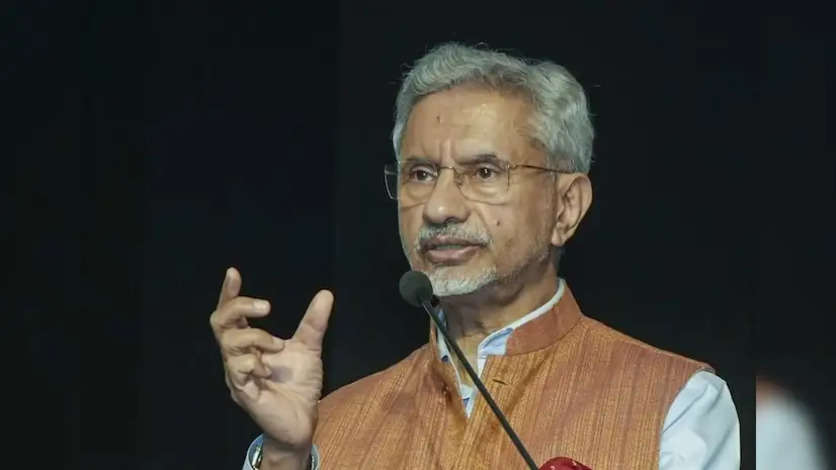Jaishankar: Kashmir Invasion Turned Dispute, Calls for Stronger UN

While speaking on the 'Defending the Integrity of Nations' session on the 'Thrones and Thorns' policy, Jaishankar dubbed some segments of Kashmir occupied by Pakistan as the most longstanding unlawful possession of a nation from the rest of the world post the second world war. Jaishankar further expounded upon the rest of his remarks on Tuesday by conveying that there is a dire need for a forceful and impartial United Nations. He criticized the United Nations for handling the terrorist approach taken to Kashmir as a conflict and treating both the perpetrator as well as the victim as equals. To finalize, the Union Minister claimed that the Kashmir region was victimized by the Pakistan invasion. To bolster his earlier statement, Jaishankar noted that the United Nations is in need of providing deeper integration on social and national laws so that justice can be achieved.
To clarify his previous statement, ‘If you don’t have an order, then you are looking at a very anarchic world’, Jaishankar commented, ‘In my view, we need an international order. It reminds me of an analogy where a domestic order exists in a country and a version of that needs to exist at an international level. It is not just superpowers that will suffer in the absence of order. I would argue that any notoriously chavish country with extreme positions that tests the system will benefit from disorder. I mean we have seen in our own neighbourhood. You don’t have to a big country to be a risky country. I have smaller neighbours who have done a pretty good job. So, first of all, we should all understand the importance of an order."
“The previous world order was an order, but it was a product of its times.”
But the thing is that in an interview with somebody and I sort of said that if you were at the receiving end of those rules or the application of those rules, we had issues. I can give you two or three practical examples. You know, if you capriciously, you know, if it suits your interests, somebody is good, not good, well, I’ll make up my mind how they’re going to do and I'll apply that order to the same country on the same issues differently,” he said.
He said that the acceptance of the Taliban in the Doha process and the Oslo process was truly remarkable. “Pay attention to Afghanistan; the same Taliban that was an outlier was welcomed into the Doha process and was welcomed in Oslo. It seems that people were fine with that at that point in time. For the people that were okay with that, today the narrative has shifted towards saying, Taliban is not doing great things. If at all, they have been doing a lot of what was discussed in Oslo and Doha. You had a British general at that time who said th,ey are country boys with their own honour code'. When it is convenient for you, they'll be fine,” he said.
The EAM characterized "sovereignty and territorial integrity" as the, "bedrock of global rules." He also talked about political meddling where, for example, in the case of the West going into other countries, - it is apparently in the ‘perseverance’ of democratic freedoms. Freely stated. But when some other countries came in the West, it appears to be a “very malign intention.”
Jaishankar remarked, "Let’s give you a second case, so I think we all can point at sovereignty and territorial integrity. All of us agree. It’s a vital principle. The bedrock of global rules. After the Second World War, there was a longest standing illegal, I would say, presence, occupation of territory by one country, India, what we saw in Kashmir. Granted, we did have to go to the UN. What was an invasion? It was metamorphosized into a dispute, where the attacker and the victim were put on par. Who were the troublesome parties? UK, Canada, Belgium, Australia, USA. So, pardon me, I have question marks on that one. Now, I can give you many more. Speaking of today. Political interference. The West goes out to other countries. It’s apparently in the pursuit of democratic freedoms.
“They appear to be highly sinister in their objectives when other nations enter the West," remarked Blanal and Jaishankar.
Emphasizing the significance of a strong UN, EAM Jaishankar noted, “I think we first need to have an order and there must be fairness. There must be a strong global order with some basic consistency of standards.” To the east of us, we have military crews in Myanmar. No. They seem to be alright. To the west, we have more of them even less frequently. You know where? I think it’s critical to assess the world in the past eight decades and be truthful. Today that the balances, the shareholders of the world, have changed. We need a different order. We need frankly, in that sense, a different conversation. Slovakia’s minister of Foreign and European Affairs Juraj Blanar with former Swedish Prime Minister Carl Bildt, Liechtenstein’s minister of foreign Affairs, Education, and Sport Dominique Hasler, founder of the Fiker Institute dubai Abulhoul and Jaishankar have attended this session jointly.
The Observer Research Foundation is conducting the Raisina Dialogue from 17 to 19 March in Delhi in collaboration with the Ministry of External Affairs. It is the leading conference organized in India on geopolitics and geoeconomics concerned with some of the toughest problems of the international community.
